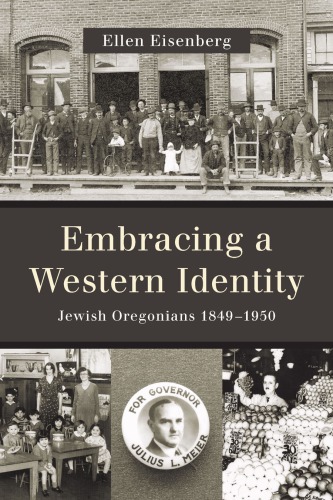Product desciption
Embracing A Western Identity Jewish Oregonians 18491950 Ellen Eisenberg by Ellen Eisenberg 9780870718182, 0870718185 instant download after payment.
Not all of Oregon’s pioneers were Christian farmers or bachelor prospectors. Indeed, many of the first brick buildings on Oregon’s newly platted Main Streets were built by Jewish merchants whose services were essential to town founding and growth.
In Embracing a Western Identity, Ellen Eisenberg places Jewish history in the larger context of western narratives, challenging the traditional view that the “authentic” North American Jewish experience stems from New York. The westward paths of Jewish Oregonians and their experiences of place shaped the communities, institutions, and identities they created, distinguishing them from other American Jewish communities. Eisenberg traces the Oregon Jewish experience from its pioneer beginnings in the mid-nineteenth century to the highly concentrated Portland communities of the mid-twentieth century.
Drawing on extensive archival resources at the Oregon Jewish Museum and Center for Holocaust Education, this historical commentary explores patterns of migration and settlement, the place of Jews in the state’s ethnic landscape, their engagement in politics, the development of institutions, and their relationship to Zionism. Departing from familiar treatments of the Jewish experience, Embracing a Western Identity provides a critical look at the impact of place and opportunity upon the identities of migrants both as Oregonians and as American Jews. Readers and scholars interested in western history—religious, ethnic, expansionist, and otherwise—will enjoy Eisenberg’s accessible writing style and rich photograph collection.
Ellen Eisenberg is the Dwight and Margaret Lear Professor of American History at Willamette University in Salem, Oregon, where she has taught since 1990. She is the author of Jewish Agricultural Colonies in New Jersey, 1882-1920 (1995), The First to Cry Down Injustice: Western Jews and Japanese Removal during WWII (a 2008 National Jewish Book Award finalist), and Jews of the Pacific Coast: Reinventing Community on America's Edge (2010), co-authored with Ava F. Kahn and William Toll.
"Eisenberg makes a major contribution to both the study of Jews in the Northwest and the broader question of how scholars should think about ethnic identity in the West."-Dale Soden, The Western Historical Quarterly
"Ellen Eisenberg's Embracing a Western Identity is a gift not only to historians of American Jewry, Oregon and the Pacific Northwest, and the American West but also to all scholars of local history and minority communities. In its thoughtful, elegant approach, Eisenberg's book is a model of how to write local history..."-Natan M. Meir, Oregon Historical Quarterly


